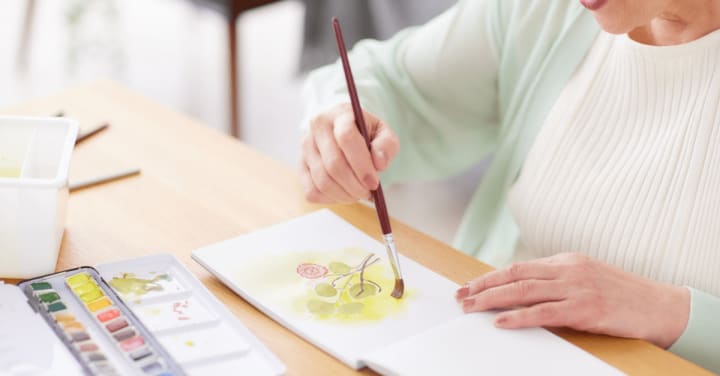Alzheimer's care in Nichols Hills becomes more meaningful as families get involved in art therapy together. Research proves that people with Alzheimer's and other forms of dementia do better in small, supportive settings that encourage creative expression. The Generations in Bloom approach uses art to build bridges between family members and turn difficult moments into lasting connections.
Art therapy creates a powerful universal language that transcends communication barriers often experienced with Alzheimer's and memory-related conditions.
Shared creative activities significantly strengthen family bonds while reducing stress and enhancing emotional well-being for both caregivers and their loved ones facing memory challenges. Simple artistic expressions—from basic painting to intergenerational craft projects—provide meaningful connection opportunities that honor dignity and preserve relationships, even as cognitive abilities change.
Why Art Therapy Matters in Alzheimer’s Care
Art therapy is a chance to help people with Alzheimer's disease, especially when you have it as part of an all-encompassing approach. The concept of "Generations in Bloom" comes alive in art therapy settings. Creative expression becomes a powerful tool that connects people despite cognitive challenges.
Art activities create a vital space for people with memory impairments to express themselves without verbal pressure, tapping into brain areas that remain preserved even as Alzheimer's progresses. This creative outlet reduces anxiety and agitation while improving mood and self-esteem, making it a cornerstone of quality memory care by shifting focus from limitations to possibilities.
Family-Friendly Art Activities for Alzheimer’s Support
Artistic expression brings Generations in Bloom to life through meaningful connections that transcend an Alzheimer's diagnosis.
-
Simple creative activities like collage making, watercolor painting and clay sculpting create profound interactions while reducing anxiety.
-
Pressure-free experiences focus on the process rather than results, allowing genuine moments of connection to flourish.
-
Tactile engagement with various materials and textures creates emotional bridges when verbal communication falters.
-
Nature-inspired art expeditions combine gentle exercise with creativity, strengthening both physical coordination and emotional bonds.
Guided tracing projects provide accessible options for those at different cognitive stages.
Artistic perfection isn't the goal—meaningful moments of connection matter most through collaborative art projects with family.
These creative sessions create lasting memories that honor both the artistic journey and the precious time spent together.

Reflection Prompts for Deeper Connection
Talking meaningfully with loved ones experiencing Alzheimer's presents unique challenges, but Generations in Bloom thrives on these personal exchanges. Art therapy sessions create valuable opportunities for communication when everyone remains present at the moment, transforming simple creative activities into profound bonding experiences.
Rather than asking potentially stressful memory-based questions like "Do you remember when..." gentle prompts about colors, feelings or preferences allow natural conversation to flow while reducing anxiety and depression.
Quality conversations matter more than quantity, especially during creative processes, which form the foundation of meaningful exchange. Even in late dementia stages, participants may engage with colors, textures or rhythms in ways that transcend traditional communication. Simple questions like "What feelings does this color bring up for you?" or sharing your own experiences before asking open-ended questions creates a nice space for expression and strengthens connections through Collaborative Art Projects with Family, benefiting everyone involved regardless of cognitive ability.
Where Art Becomes the Language of Love
Art therapy builds a powerful bridge between family members affected by Alzheimer's, with "Generations in Bloom" approaches deepening connections while overcoming communication barriers that accompany memory loss. The beauty lies in its accessibility, requiring no artistic talent, just a willingness to share in the creative process where colors and textures build connections that words alone cannot create, fostering new memories instead of focusing on those that have faded.
The Alzheimer's journey brings numerous challenges, but creative engagement offers a path filled with meaningful connections, with studies showing reduced anxiety, improved mood and increased social interaction among participants. We've witnessed remarkable transformations—from non-verbal grandmothers suddenly sharing stories about their paintings to fathers with daily living challenges beaming with pride over their sculptures. For more information about incorporating Collaborative Art Projects with Family into your loved one's care plan, call Iris Memory Care of Nichols Hills at (405) 286-9500 to begin your creative journey today.
FAQs
Q1. How does art therapy benefit individuals with Alzheimer's?
Art therapy can help reduce anxiety, agitation and depression in people with Alzheimer's. It stimulates creativity, improves mood and enhances self-esteem. Engaging in artistic activities can also provide a non-verbal means of expression and communication.
Q2. What types of art activities are suitable for families supporting someone with Alzheimer's?
Family-friendly art activities include collage making, watercolor painting, clay sculpting, nature-inspired art and guided tracing projects. These activities are suitable for all skill levels and provide opportunities for meaningful connection and sensory stimulation.
Q3. How can art therapy strengthen family bonds in Alzheimer's care?
Art therapy creates shared experiences that foster non-verbal bonding and moments of joy. It shifts focus from limitations to possibilities, allowing families to create new memories together. The creative process provides a foundation for meaningful exchange and deeper connections.

